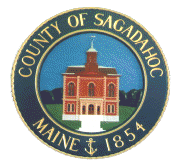|
|
|||||
|
Sagadahoc County Finances
SAGADAHOC COUNTY FINANCES
BUDGET YEAR Sagadahoc County operates on a fiscal year which runs from July 1stthrough June 30th . The County changed its budget year from a calendar year to a fiscal year in 2005 in a proactive move to be “in sync” with the majority of its municipalities and to reduce the County’s reliance upon Tax Anticipated borrowing. The change-over was labor intensive and required special State enabling legislation. During the eighteen month transition process, the County coordinated closely with each Sagadahoc municipality, some of which had to obtain short term loans to offset the financial impact created by the changed County Tax Levy due date. Changing to fiscal year was no easy task and the success of the project can be attributed directly to the cooperation of the ten Sagadahoc municipalities. Until recently, Sagadahoc was the only Maine County on a fiscal year. The State, which has encouraged the other 15 Counties to change to a fiscal year, has pointed to the Sagadahoc change-over as the model to be used by the other Counties. FUND ACCOUNTING AND GROSS BUDGETING In accordance with the Governmental Standards Accounting Board (GASB), the County utilizes fund accounting and gross budgeting to maximize clarity and transparency in all of its financial matters. Fund accounting requires that revenues and expenditures designated for a purpose other than the County’s general operations, be recorded and monitored separately from the County’s general funds. Examples of these separate funds are: Grants, Capital Improvement Reserve Funds and the Corrections Related Fund. Likewise, the County utilizes gross budgeting which requires revenues and expenditures to be recorded and monitored separately so that expenditures are capped at their appropriated level and spending is not distorted by any surplus or shortfall in revenues collected over the budget year. AUDIT The County’s finances are audited annually by a certified public accounting firm (presently by Runyon, Kersteen and Ouellette of South Portland). Copies of the 2009-2010 financial audit reports may be found on this web site and audits of prior years are available to at the County Administrative Offices (call 443-8202). BUDGET PROCESS Every December County Department Heads are asked to submit the preliminary budgets for their department(s). The Department Heads review and analyze expenditures for the current year as well as the past several years to project an anticipated annual expenditure for each budget line-item (category) for the upcoming year. In January, the Commissioners begin their process of projecting revenues, identifying future capital improvement needs, and reviewing each departmental budget line by line. Department Heads meet with the Commissioners to discuss the proposed budget and provide additional information or documentation. No later than April 15th, the Commissioners must present their proposed budget to the Budget Advisory Committee who, by then, has held an organizational meeting and is ready to hear presentations from the Department Heads. In April the BAC holds a public hearing to present their recommended budget to the public and to solicit comments, questions and suggestions regarding the budget from citizens. After considering any public input received, the BAC formulates its final recommendations to the Board of Commissioners. The Commissioners study the BAC’s recommendations and make necessary changes to the budget. Final approval of the budget by the Commissioners must occur prior to June 15that which time the County is required to submit the budget to the State of Maine Department of Audit. BUDGET ADVISORY COMMITTEE The County’s Budget Advisory Committee is made up of two municipal officials and one public representative from each of the three County Districts. State law requires the County to hold caucuses for the purpose of electing municipal official and public representatives to fill vacancies. The BAC members serve three year terms and are elected by only those municipal officials who attend the annual BAC Caucuses. The County is required by the State to hold a caucus for each of the three County Districts no later than February 15th. In Sagadahoc County, the three Districts caucus simultaneously in a brief and informal event that customarily occurs the first week in February. At the caucuses, municipal officials meet, by District, to nominate and elect municipal officials and/or public representatives to fill vacancy(ies) in their District. The process normally takes about a half an hour. Commissioners attend their District’s caucus but do not vote. if the proposed County budget exceeds the County’s statutory LD 1 growth cap, the BAC has approval authority over the budget. The prospect that Sagadahoc County will exceed its LD 1 growth cap is very slim since frugal budgeting over a span of many years has put Sagadahoc County in the unique position of having a budget that falls more than two million ($2,000,000) dollars below its LD 1 cap. However, if the LD 1 cap is breached, the BAC’s approved budget may be changed only by a unanimous vote of the Board of Commissioners. While the official “who gets to approve what” appears to be adversarial, in practice, the process is not. Over the years, the perspectives and decisions of the Board and BAC have become increasingly congruent. Each group brings to the process insight and questions that challenge management to continually search for more effective and less costly ways to provide quality services. |
||||

 Government Home Page
Government Home Page